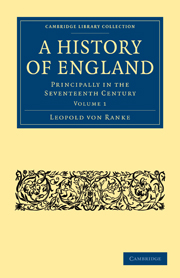Book contents
- Frontmatter
- PREFACE
- TRANSLATORS' PREFACE
- Contents
- BOOK I THE CHIEF CRISES IN THE EARLIER HISTORY OF ENGLAND
- BOOK II ATTEMPTS TO CONSOLIDATE THE KINGDOM INDEPENDENTLY IN ITS TEMPORAL AND SPIRITUAL RELATIONS
- BOOK III QUEEN ELIZABETH. CLOSE CONNEXION OF ENGLISH AND SCOTTISH AFFAIRS
- BOOK IV FOUNDATION OF THE KINGDOM OF GREAT BRITAIN. FIRST DISTURBANCES UNDER THE STUARTS
- BOOK V DISPUTES WITH PARLIAMENT DURING THE LATER YEARS OF THE REIGN OF JAMES I AND THE EARLIER YEARS OF THE REIGN OF CHARLES I
- INTRODUCTION
- CHAP. I James I and his administration of domestic government
- CHAP. II Complications arising out of the affairs of the Palatinate
- CHAP. III Parliament of the year 1621
- CHAP. IV Negotiations for the marriage of the Prince of Wales with a Spanish Infanta
- CHAP. V The Parliament of 1624. Alliance with France
- CHAP. VI Beginning of the reign of Charles I, and his First and Second Parliament
- CHAP. VII The course of foreign policy from 1625 to 1627
- CHAP. VIII Parliament of 1628. Petition of Right
CHAP. III - Parliament of the year 1621
Published online by Cambridge University Press: 07 June 2011
- Frontmatter
- PREFACE
- TRANSLATORS' PREFACE
- Contents
- BOOK I THE CHIEF CRISES IN THE EARLIER HISTORY OF ENGLAND
- BOOK II ATTEMPTS TO CONSOLIDATE THE KINGDOM INDEPENDENTLY IN ITS TEMPORAL AND SPIRITUAL RELATIONS
- BOOK III QUEEN ELIZABETH. CLOSE CONNEXION OF ENGLISH AND SCOTTISH AFFAIRS
- BOOK IV FOUNDATION OF THE KINGDOM OF GREAT BRITAIN. FIRST DISTURBANCES UNDER THE STUARTS
- BOOK V DISPUTES WITH PARLIAMENT DURING THE LATER YEARS OF THE REIGN OF JAMES I AND THE EARLIER YEARS OF THE REIGN OF CHARLES I
- INTRODUCTION
- CHAP. I James I and his administration of domestic government
- CHAP. II Complications arising out of the affairs of the Palatinate
- CHAP. III Parliament of the year 1621
- CHAP. IV Negotiations for the marriage of the Prince of Wales with a Spanish Infanta
- CHAP. V The Parliament of 1624. Alliance with France
- CHAP. VI Beginning of the reign of Charles I, and his First and Second Parliament
- CHAP. VII The course of foreign policy from 1625 to 1627
- CHAP. VIII Parliament of 1628. Petition of Right
Summary
We already know the antipathy of James to the Parliament, which had become a power to which, as soon as it was manifested in a newly assembled House, the power of the King was obliged to bend. James had already often felt the ascendancy of Parliament. The schemes of union with Scotland, which filled his soul with ambition, had been shattered by the resistance of that body. The exclusively Protestant disposition which prevailed there had made it impossible for him to give a legal sanction to the favour which he entertained for the Catholics, and which his views of policy naturally disposed him to show. He had been obliged to desist from the attempt to secure financial independence by surrendering the feudal privileges of the crown. The Parliament raised claims which the King regarded as attacks on the prerogative of the crown: even his advances to it had been met by a stubborn resistance. In the ordinary course of things he would never again have summoned Parliament together.
This complication in foreign affairs then arose. All parties, including even the King himself, were convinced that England must step forth armed among the contending powers of the world: and that, not in the fashion of the last expedition, so little in keeping with the situation, when private support and tacit sympathy found the means, but on a large scale, as the position of the kingdom among the great powers demanded. But without Parliamentary grants this was impossible.
- Type
- Chapter
- Information
- A History of EnglandPrincipally in the Seventeenth Century, pp. 497 - 508Publisher: Cambridge University PressPrint publication year: 2010First published in: 1875



